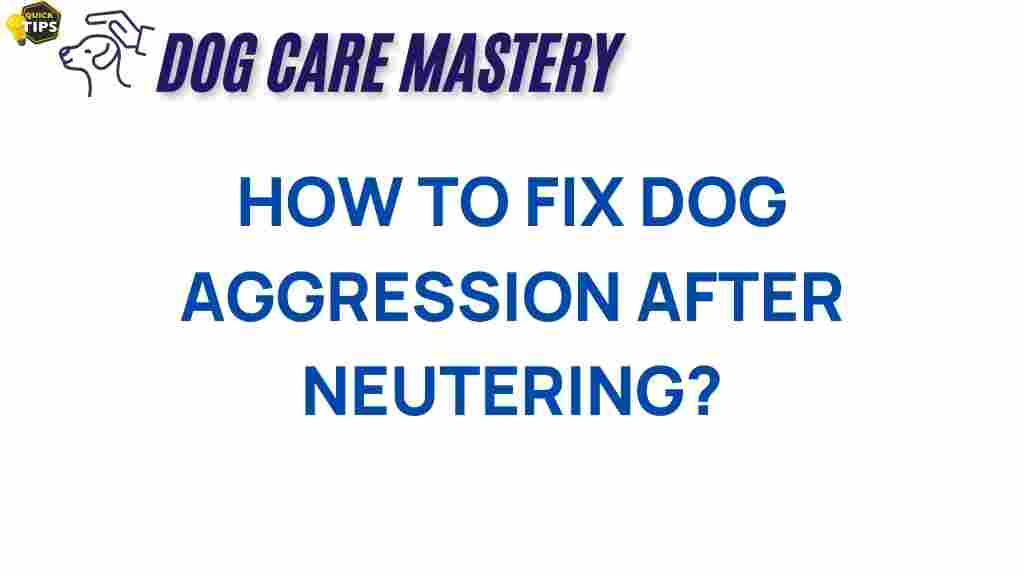Understanding Dog Aggression: What Happens After Neutering?
Dog aggression is a complex issue that many pet owners face. It can manifest in various forms, including fear-based aggression, territorial aggression, and even play aggression. One common question among dog owners is whether neutering can alleviate aggressive behaviors. In this comprehensive guide, we will explore the relationship between dog aggression and neutering, what to expect after the procedure, and how to manage your dog’s behavior post-neutering.
What is Dog Aggression?
Before delving into the effects of neutering, it’s crucial to understand what dog aggression entails. Dog aggression is typically characterized by behaviors that can lead to harm or intimidation towards people or other animals. Some common signs of aggression include:
- Growling
- Barking
- Snarling
- Showing teeth
- Bitten or lunging
Understanding the root causes of aggression can help in addressing the behavior effectively. Aggression can stem from various factors, including genetics, environment, and experiences.
The Role of Neutering in Dog Aggression
Neutering, or castration, involves the surgical removal of a male dog’s testicles. This procedure is often recommended for various reasons, including population control and health benefits. However, many pet owners wonder how neutering impacts dog aggression.
Myths Surrounding Neutering and Aggression
There are several myths about neutering that can lead to misconceptions regarding dog aggression:
- Myth 1: Neutering will completely eliminate aggressive behavior.
- Myth 2: All aggressive dogs should be neutered to fix the problem.
- Myth 3: Neutering leads to a complete personality change in dogs.
While neutering can reduce certain types of aggression, such as hormone-driven dominance behaviors, it is not a guaranteed solution for all forms of dog aggression.
What Happens After Neutering?
After the neutering procedure, dog owners may notice several changes in their pets. Here’s what to expect:
1. Immediate Post-Operative Effects
Right after neutering, your dog may experience:
- Discomfort and lethargy
- Reduced appetite
- Possible swelling at the surgery site
It’s crucial to monitor your dog during the recovery phase and follow your veterinarian’s post-operative care instructions.
2. Behavioral Changes
Within a few weeks to months post-neutering, some owners may notice changes in their dog’s behavior:
- Reduced Aggression: Hormonal aggression may decrease, particularly in cases of dominance or territorial issues.
- Less Wandering: Neutered males are less likely to roam in search of females, which can reduce aggression related to mating instincts.
- Calmness: Many owners report a calmer demeanor in their dogs after neutering.
However, it’s essential to remember that these changes can vary widely among individual dogs. Some may show significant improvement, while others may not exhibit noticeable changes in their aggression levels.
Managing Dog Aggression Post-Neutering
After neutering, managing your dog’s aggression is crucial. Here are several strategies to consider:
1. Training and Socialization
One of the most effective ways to manage dog aggression is through consistent training and socialization. Here are some tips:
- Basic Obedience: Teach your dog commands such as sit, stay, and come. This helps establish you as the leader.
- Positive Reinforcement: Reward good behavior with treats or praise to encourage positive interactions.
- Socialization: Introduce your dog to various environments, people, and other animals to reduce fear-based aggression.
2. Consult a Professional
If your dog’s aggression persists or worsens after neutering, consider consulting a professional dog trainer or a certified animal behaviorist. They can help identify triggers and develop a tailored training program.
3. Use of Tools
In some cases, tools such as muzzles or harnesses can help manage aggressive behavior safely. Ensure you choose the right type and fit for your dog.
4. Behavioral Medication
In severe cases of aggression, medication may be necessary to help manage your dog’s behavior. Consulting with a veterinarian can provide you insight into this option.
Troubleshooting Common Issues
Despite neutering and training, some dogs may still exhibit aggressive behaviors. Here are some troubleshooting tips:
- Aggression Towards Other Dogs: If your dog shows aggression towards other dogs, avoid situations where they might encounter triggers. Gradually introduce them to other dogs in a controlled environment.
- Fear-Based Aggression: Understand the situations that trigger fear in your dog and work on desensitization techniques.
- Redirecting Aggression: If your dog becomes aggressive, redirect their attention with a toy or treat to prevent escalation.
Conclusion
Understanding dog aggression and the impact of neutering is vital for any dog owner. While neutering can help reduce certain aggressive behaviors, it is not a one-size-fits-all solution. Each dog is unique, and their aggression may have various underlying causes that require tailored approaches.
Consistent training, socialization, and sometimes professional help can significantly improve your dog’s behavior. If you’re considering neutering as a solution for dog aggression, consult with your veterinarian to discuss the best strategy for your pet.
For more detailed resources on dog training and behavior, visit this helpful guide. And if you are looking for more information on dog aggression, you can check out this external resource.
This article is in the category Behavior and created by dogcaremastery Team
